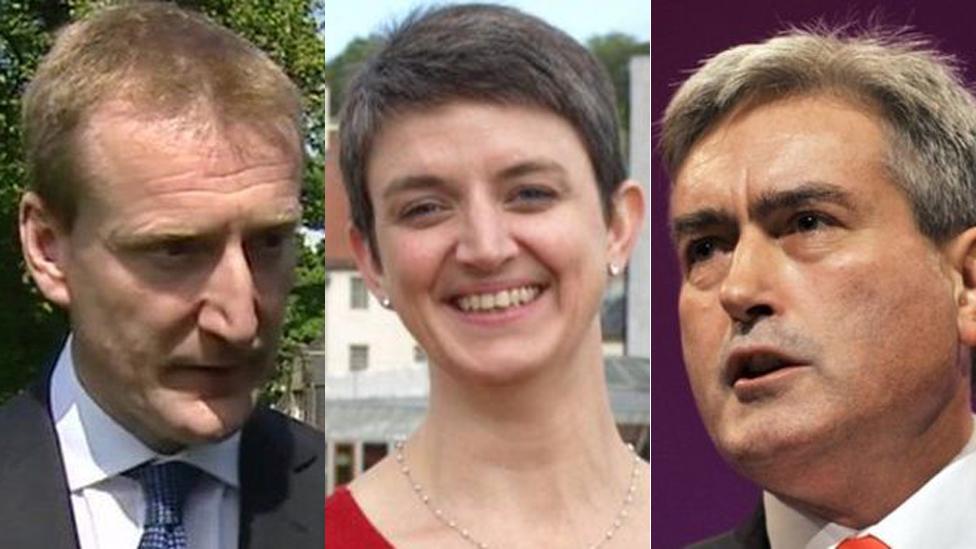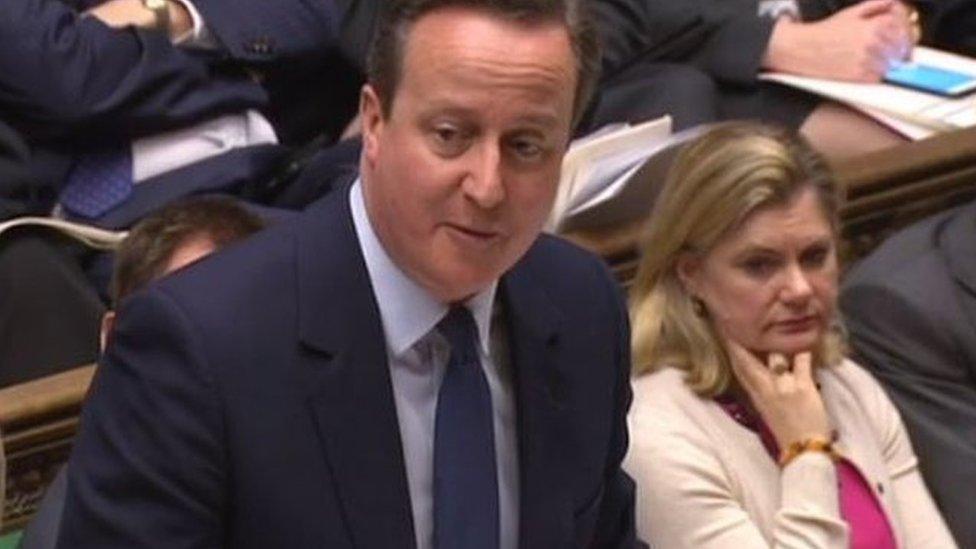Deadline extended for talks on Scots fiscal framework
- Published

Proposed new powers for Holyrood cannot proceed until a deal is struck on the fiscal framework
The deadline for a deal on Scotland's future finances has been pushed back as negotiations continue on the so-called fiscal framework.
A deal was meant to be agreed by Friday, but MSPs have now pushed the deadline back to 23 February.
The prime minister has said the Scottish government must be prepared to give ground in the talks.
BBC Scotland understands the Treasury and Scottish government are to table fresh proposals in the coming days.
Meanwhile, some key opposition politicians have told BBC Scotland they back the Scottish government's stance.
Talks over the fiscal framework have been going on for several months, but have stalled over differences of opinion on the Smith Commission's "no detriment" principle - the idea that any deal should not impact adversely on the budgets of Scotland or the rest of the UK.
The Scotland Bill on new powers for the Scottish Parliament, which is currently going through Westminster, cannot proceed until an agreement is reached.
The two sides will now have extra time to thrash out a deal after the devolution committee demanded a "full explanation" of their positions by a meeting on 23 February.
Convener Bruce Crawford said there would be "very substantial impacts" on the Scottish Parliament's ability to scrutinse the deal if matters were delayed beyond 19 February.
He said the Holyrood and Westminster teams would have to give a "full explanation of their position on a fiscal framework" at the committee's meeting on 23 February, "whatever the circumstances".
Population growth
Scottish Finance Secretary John Swinney said Scotland stood to lose about £3bn over 10 years under proposals put forward by the UK Treasury.
This would be because Scotland's population is expected to grow more slowly than the UK's.
The Treasury is to table a fresh offer, which BBC Scotland understands would include £4.5bn of compensation for the impact of population growth, spread over 10 years.
However, First Minister Nicola Sturgeon said this simply restated existing proposals, calling the figure "the difference between the UK government's opening position of a £7bn cut and current position of an almost £3bn cut".
Scottish ministers have argued that they cannot effectively tackle slower population growth without immigration powers.

Mr Scott, Ms Chapman and Mr Gray are among the opposition politicians to back the Scottish government's stance on the "no detriment" principle
Six of the 10 members of the cross-party Smith Commission which drew up the blueprint for the devolution settlement, including senior Labour, Liberal Democrat and Scottish Green members, have said they broadly support the Scottish government over the issue.
They include Labour's Iain Gray, Liberal Democrat Tavish Scott and Green co-convenor Maggie Chapman, who explicitly back calls for budget protection from the population effect.
Mr Gray said: "To a degree I think I largely agree with John Swinney on this position. What has been talked about is a population trend which is in place and would be nothing to do with decisions that had been taken in Scotland. In my view it does have to be factored into the discussions."
Mr Scott agreed it was "logical" that the new fiscal framework should take Scotland's slower population growth into account.
'Terrible shame'
And Ms Chapman said: "We heard time and time again during the referendum campaign that if Scotland voted 'No' it would be better for everybody because we were all in this together.
"Under that principle, the UK government has a responsibility to ensure that Scotland does not face detriment."
Lord Smith himself said he would not comment on the details while talks were ongoing, but said it was "vital" the two governments resolve their differences.
He said: "The new powers set out in the Scotland Bill will lead to a transformation of the powers held by Holyrood and it would be a terrible shame if they were to fall away at this late stage."

David Cameron told the Commons on Wednesday that no-one was keener than him to secure a deal
But Adam Tomkins, a Conservative member of the Smith Commission, said: "The no detriment principle is a principle that must be applied equally to taxpayers in Scotland and to taxpayers in the rest of the United Kingdom, it is not a one-way insurance policy."
Meanwhile, a House of Commons committee has called on the two governments to explore an adjusted version of the method favoured by the Scottish government in order to find a solution to the apparent deadlock.
The method - known as per capita indexed deduction - would take Scotland's slower population growth into account.
More attractive
The Scottish Affairs Committee said an additional adjustment could be applied to secure the principle of taxpayer fairness for both Scotland and the rest of the United Kingdom.
It has also suggested that the operation of the new fiscal framework should be reviewed after four years.
During Prime Minister's Questions on Wednesday, David Cameron said "no-one is keener on agreement" than he was.
But in a letter to First Minister Nicola Sturgeon, Mr Cameron said the Scottish government "need to be prepared to move towards us".
He said any deal must to be fair for taxpayers across the UK as well as in Scotland, and claimed the Scottish government seemed to lack confidence in its ability to make Scotland an even more attractive place for people to live.
Mr Swinney responded: "Any mechanism that would systematically reduce the Scottish government budget simply as a result of devolution and before the Scottish government makes any policy choices is unacceptable and will not be agreed by the Scottish government".